NRL’s $135 billion rich list: The media giants, mining magnates and investment gurus backing clubs
Four of the top five on Australia’s richest list are all now entrenched in the NRL. See the list of tycoons investing in the code and hear why they are parting with their cash.
NRL
Don't miss out on the headlines from NRL. Followed categories will be added to My News.
Rugby league used to be the working-class game, funded by chook raffles and poker machines.
Over the years many clubs could not survive.
The billionaires, bankers, lawyers, surgeons and chief executives were all in rugby union.
Not anymore.
These days the media giants, mining magnates, construction tycoons and financial investment gurus are now heavily invested in the NRL. They are worth a combined $135 billion.
Four of the top five on Australia’s richest list are all now entrenched in the NRL – the Murdoch family, who own the Brisbane Broncos, Mike Cannon-Brookes, part owner of the South Sydney Rabbitohs, Harry Triguboff, a Wests Tigers benefactor and Andrew ‘Twiggy’ Forrest, a St George Illawarra sponsor.
And then there’s James Packer, Mike Dorrell, Nick Politis, Arthur Laundy and Bruce Gordon.
It’s a who’s who of corporate Australia.
“You just can’t put a value on the contributions they are making to rugby league,” says independent commission chairman Peter V’landys.
“It’s such a huge vote of confidence in our game.”
One of the more recent additions to rugby league’s rich list is Mike Dorrell, a New York investment guru worth $13 billion, who recently donated $5 million to the Cronulla Sharks.
“I look at it now and league has left union for dead as an organisation and as a spectacle,” Dorrell says, “I honestly think we’ve got a product that’s world class. That’s why I’m involved”
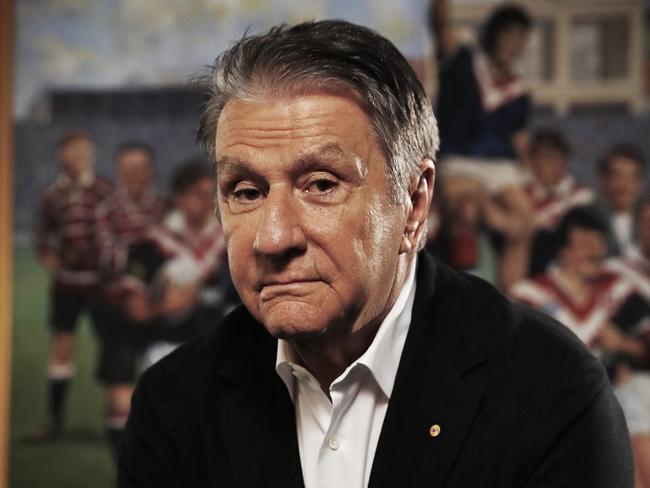
Nick Politis $2.8 billion
Sydney Roosters chairman
It’s hard to believe the car dealer and property tycoon was originally rejected by former rugby league boss Kevin Humphreys back in the mid-1970s.
Politis had gone to NSWRL headquarters for a meeting with the game’s heavyweights to ask for permission to put his dealership, City Ford, on the front of the Sydney Roosters jersey.
In return he would pay the club $50,000.
(Major sponsorships these days are worth up to $1.5 million.)
“They turned me away,” Politis said. “Kevin Humphreys said, ‘You’re not going to cannibalise the jersey while I’m in charge.’
“The game was in a bit of financial trouble back then with clubs going broke.
“So at the end of that year, 1975, I got called back in to see Humphreys. He’d worked out it was a way to bring new revenue into the game that would save a lot of the clubs.
“So City Ford became the first jersey sponsor of any sporting code in the country. I still remember it was front page news in The Australian.”
Politis wasn’t exactly flushed with funds back in those days.
He was renting a house and had only a 20 per cent share of the dealership.
“At the time Ford’s head office wasn’t that impressed,” he said.
“They’re thinking ‘why’s this guy spending all this money.’
“I just thought it would be a great thing for our brand. It was a business decision. I didn’t love the club back then like I do now.”
Politis has now been involved at the Roosters for 48 years, the last 32 as chairman.
From City Ford he now controls more than 280 car dealerships across the country as a major shareholder of Eagers and another 70 in private ownership.
Politis is the most hands on of all the billionaires, heavily involved in recruitment and in the day to day running of the football club.
Not a day goes past without a phone conversation with head coach Trent Robinson.
He will often be even seen watching the club’s next generation of stars at Harold Matthews and S.G Ball junior rep games.
Over time he has built the club from near bankruptcy in the 90s to a rugby league powerhouse, overseeing the purchases in a property portfolio worth north of $200 million.
He’s 82 now but has no plans of retiring.
“I love the club and the game too much,” he said. “It’s my life.”
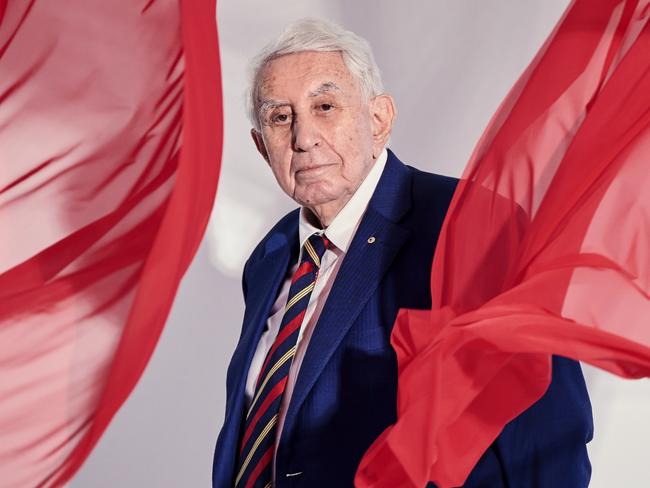
Harry Triguboff $26 billion
Wests Tigers benefactor
It was Olympic legend Dawn Fraser who first convinced the billionaire construction guru to get involved with the then Balmain Tigers in the 1990s.
“I was building in Balmain,” he said in an old interview, “Dawn Fraser was involved in the club and I liked her, she was my hero. So I joined them.”
Back in the old days prior to the strict salary cap rules, Triguboff would often enter the dressing sheds after a victory and hand out wads of cash to the players.
Australia’s biggest property tycoon is the Wests Tigers’ number one ticket holder and a life member.
The Meriton boss has financially supported the club since the joint-venture was formed in 2000, for many years as the club’s major sponsor.
These days he is not officially signed on as a sponsor but often contributes.
The money he used to hand out to the players now goes to the Wests Tigers Foundation.
Not that the cash is regularly forthcoming considering the club has finished with the wooden spoon on the bottom of the ladder for two straight years.
Triguboff is a rugby league tragic.
One of his senior employees says Monday morning office meetings are not all about his latest building projects.
That Triguboff is always talking about the just completed NRL round and in particular the performances of the Wests Tigers.
“Harry just loves the game and there’s always a lot of footy talk around the office on Monday mornings,” the employee said.
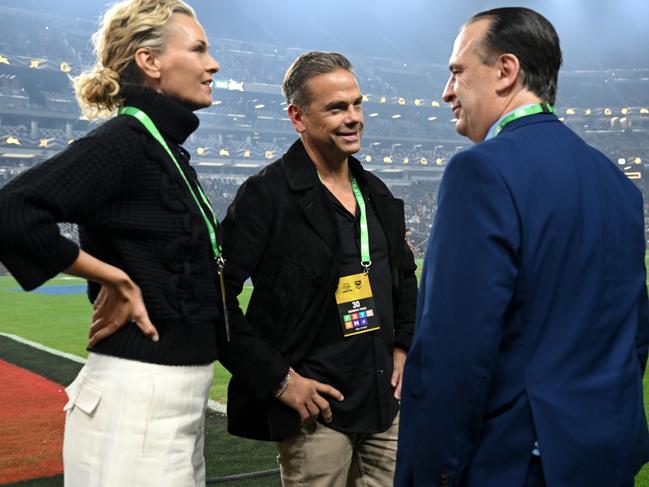
The Murdoch family $30 billion
Owners Brisbane Broncos
Lachlan Murdoch, at 22, was appointed general manager of Queensland Newspapers, the publisher of the Courier Mail, in 1993.
The Broncos were the only footy team in town, four years before the Brisbane Lions and the AFL arrived.
The now chairman of News Corp has been an ardent Broncos fan ever since.
Similarly aged players became his close mates.
The Murdoch family took over the ownership of the Broncos around 1994.
“Lachlan was welded on from the start,” says former Super League boss John Ribot, “He had a great relationship with the players. You’d often see him at team barbecues and functions.
“Keeping company in these circles was an outlet for him.”
Despite spending much of his career in the United States, Murdoch has always kept in touch with the game.
“For Lachlan it’s not about the club being a business asset,” says independent commission chairman Peter V’landys, “he’s fanatical.
“Despite his schedule running one of the world’s biggest media empires, he told me when we were in America that he’ll watch every game if he can, not just the Broncos.
“The same with State of Origin – he genuinely loves the game.”
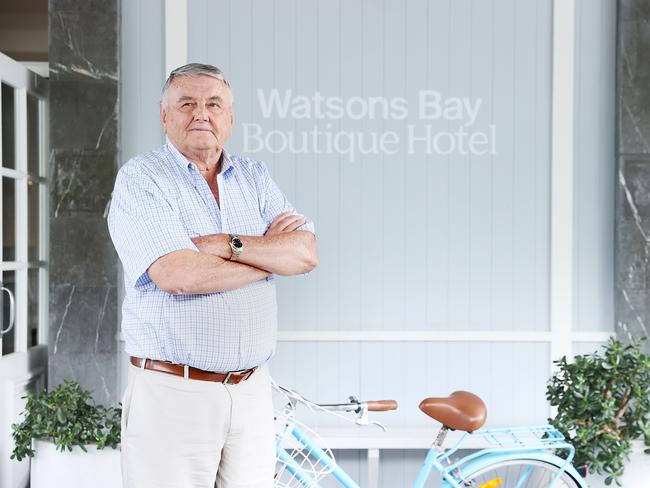
Arthur Laundy $1.65 billion
Bulldogs sponsor
The hotel tycoon is a lifelong Balmain Tigers fan, not that he was always welcome there.
Ten years ago he was invited by legendary Balmain official John Chalk to join the Wests Tigers board.
It didn’t go plan.
“I said I’d come along to a board meeting to get a feel for it,” Laundy said.
“Anyway, I’ve just walked in and one of the directors was a real obnoxious bastard.
“To this day I don’t know his name. He said to me ‘I don’t know what you’re doing here.’
“I said I’d been invited as an observer. Then he started to get a bit stroppy. He was a goose.
“So I stood up, excused myself to the chair, and walked out. I was worried I was going to say or do something to the bloke, maybe clip him over the ear, that I may have regretted. So that was it.”
He’s been a Tigers fan for as long as he can remember.
His parents owned the Sackville Hotel in the 1950s where the players would drink after training and games.
From Leichhardt to Cumberland Oval, Brookvale to the Sydney Cricket Ground, his parents would take him to the footy every week.
And then along came the opportunity at the Canterbury Bulldogs.
He got on board when the club was at rock bottom and had no major sponsor.
“I’d always had a great relationship with their old players like Geoff Robinson, Terry Lamb and David Gillespie,” he said. “They used to drink at my pubs. Now I’ve got 10 pubs in the area.”
Laundy now carries enormous influence at the club.
“It’s not just about having my name on the jumper,” he says, “I like to contribute.
“I get a real kick out of mentoring the younger players and investing on what Gus (Phil Gould) is doing in pathways.”
It was Laundy who played a pivotal role three years ago to convince Gould to come to Belmore.
“My son Stuart organised a meeting with Gus and myself one night about 6pm in the pub opposite North Sydney Oval,” Laundy said.
“Once he said he was interested I took it to management and the board and we made it happen.
“It was tough in those early days but the Bulldogs are now heading in the right direction.”
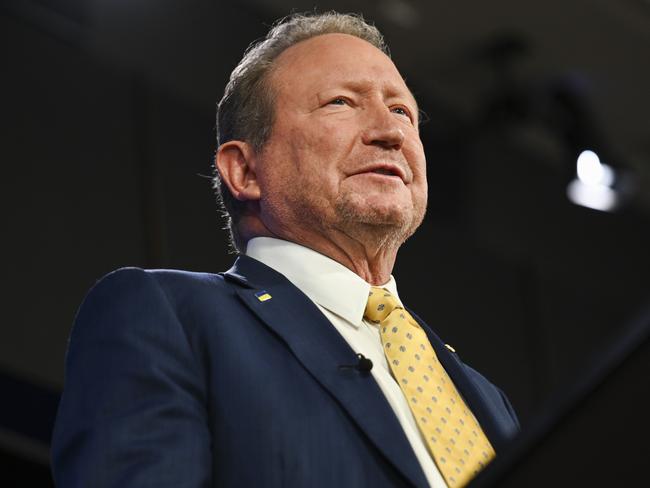
Andrew ‘Twiggy’ Forrest $31.7 billion
St George Illawarra major sponsor
He might be entrenched in Perth with the Western Force rugby union franchise but Twiggy Forest is using rugby league to promote his company Squadron Energy.
Last season the St George Bank announced it was cutting its long-term front-of-jersey sponsorship with the St George Illawarra Dragons.
Then in steps Twiggy, who signed off on a $3.5 million three-year deal with the Saints.
Squadron Energy has a significant presence in the Illawarra area and will be on the back of the jersey this year and on the front as major sponsor next season.
Forrest has little interest in the NRL outside of his sponsorship and has made no overtures to be part of the Perth bid for the 18th team in the NRL.
He just sees it as an opportunity to promote his business.
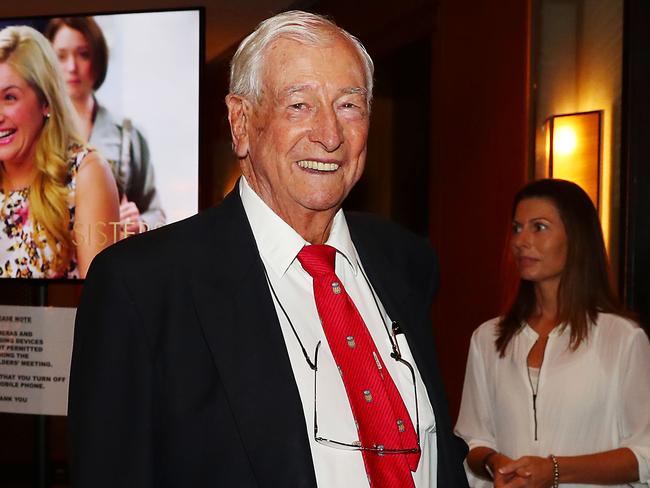
Bruce Gordon $1.5 billion
St George Illawarra part owner
The owner of WIN television and the largest shareholder in Nine Entertainment has been a Dragons fanatic for more than four decades.
In 2016 Gordon bought a 50 per cent share in the joint venture club.
“We’ve been passionate fans of the Dragons and Steelers before them for over 40 years,” he told The Sunday Telegraph.
“For us it is all about community. When the Dragons are successful, the community lifts and that is great for us all.
“It wasn’t a commercial decision but with WIN and Nine Broadcasting NRL across the country and us being Nine’s largest shareholder, there is a good fit.
“That said, Peter V’landys and Andrew Abdo are doing a great job growing the NRL, and that has to be good for all stakeholders of the game and clubs.”

Andrew Hrsto $1 billion
Parramatta Eels major sponsor
Hrsto is the founder of property developer giants, Aland, and has been a sponsor of the Eels for 10 years.
He lives in a $25 million Vaucluse home but was raised in a battling family in Eels territory in Sydney’s western suburbs.
“Growing up in Sydney’s west rugby league was a big part of my everyday life,” he said.
“Kids from the neighbourhood would play footy at school and on the streets until dark.
“Playing footy with my friends was one of the happiest memories of my childhood because it gave us all a sense that we belonged to a community.
“We didn’t have much money but we had the time of our lives running around, arguing about who got to be Mick Cronin, Ray Price or Neville Glover.”
This guy is an absolute Eels tragic.
“I remember crying to my grandmother after the 1976 or 1977 grand final loss and her saying ‘there’s always next year.’
“I can’t describe how important that memory and her advice has been for me throughout my life.
“l feel so privileged to play some part in the Eels organisation through Aland’s sponsorship of the club, now and into the future.”
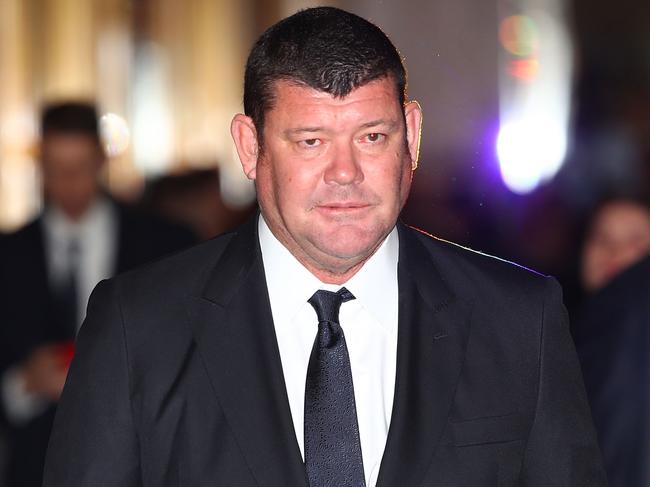
James Packer $4.2 billion
Rabbitohs part-owner
Packer shocked many of his old eastern suburbs mates when in 2014 he bought Peter Holmes a Court’s share in the South Sydney Rabbitohs for $12.5 million.
Shocked because he had grown up a fan of Souths’ arch rivals the Sydney Roosters and sat on their board in the mid-nineties alongside the likes of David Gyngell and Nick Politis.
He only recently made peace with Politis when the pair met privately for the first time in almost a decade in Las Vegas.
Packer’s father Kerry was a Souths fan.
“This is a very proud day for my family,” Packer said when he bought his share, “My father had a long history and association with Souths and to now be a co-owner with Russell Crowe and the members is an honour and a privilege.”
Packer however has rarely been seen at a Souths match.
He was in Las Vegas to watch the Rabbitohs against the Manly Sea Eagles but hasn’t been spotted at a Souths match in Australia since taking ownership.
“He doesn’t have a lot of interest in rugby league these days, let alone Souths,” said one of his associates.
Packer did however play a role in Souths signing superstar fullback Latrell Mitchell in 2020.
He joined Crowe and old super coach Wayne Bennett on the Hollywood superstar’s Nana Glen estate for a dinner with Mitchell to help convince him to join the Rabbitohs.
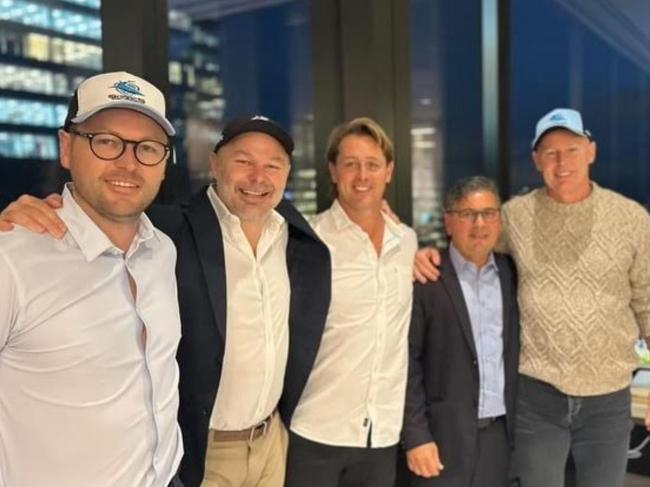
Mike Dorrell $13 billion
Cronulla Sharks benefactor
One of Australia’s great untold business success stories.
Born in Sutherland Shire with his father a teacher of Port Hacking High, Dorrell owns Stonepeak, an American investment powerhouse headquartered in New York that manages $65 billion in global assets.
Out of the blue he recently made a $5 million cash donation to the Cronulla Sharks.
We met over breakfast recently while Dorrell is on a rare visit back home.
This guy is another old footy tragic who starts telling stories from his days as a young Sharks fan.
“I followed the Sharks as much as you could follow a football team,” he said. “When they lost, I’d hit the TV or throw something at the wall and mum and dad would kick me out of the house until I cooled down.
“I have followed them religiously from Steve Rogers, to ET (Ettingshausen), Gavin Miller and Mark ‘Sparkles’ McGaw, to David Peachey and onwards.
“I have watched and re-watched the 2016 Grand Final, a game which gave every Sharks fan a near heart attack in the final minutes, followed by a multi-generational outpouring of joy when we won.”
Dorrell is as competitive as they come.
He plays for a New York team in an annual touch football tournament in America.
“Our team got killed in the early days,” he says.
“So I looked up on the internet to find the Australian touch footy coach. It was a guy called Tony Trad. He coached Australia and had just retired. So I flew him over the U.S. for a month to train us. And we won.”
He says he has invested in the Cronulla Sharks because of his confidence in the NRL and the Cronulla Sharks administration, chairman Steve Mace and CEO Dino Mezzatesta.
“When I left Australia rugby union was neck and neck with league,” he said. “Union had the momentum probably.
“I look at it now and league has left union for dead as an organisation and as a spectacle.
“I honestly think we’ve got a product that’s world class. That’s why I’m involved”
I ask Dorrell how he’d like his $5 million spent.
“I’d like to buy Reece Walsh,” he laughs, “Seriously, I’ve told them to, ‘Spend it how you want’.
“That the confidence I have in the club management. Who am I to tell them how to use it.”
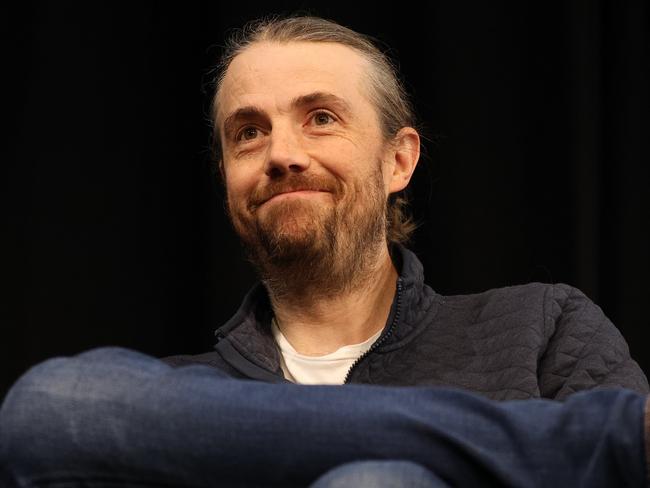
Mike Cannon-Brookes 22.9 billion
Part-owner Rabbitohs
It was in the aftermath of the Black Summer bushfires that Cannon-Brookes got to meet Hollywood superstar Russell Crowe at a climate change event.
“We sort of bonded over that and shared a few beers,” Cannon-Brookes said. “As a process of that he found out I was a (Souths) fan and we talked a lot about the club and what it could do and how we could help out
“And it matured from there until he said: ‘Hey why don’t you come on board more formally?’”
Cannon-Brookes has a genuine love for the game.
Of all his business interests, he’s as passionate about the Rabbitohs as anything else.
You look back at his quotes when he first joined the ‘Pride of the League’.
“It feels awesome. I feel super-excited, super-pumped,” he said.
“And a sense of responsibility – it’s a bit daunting. The responsibility to keep growing the legacy. It’s such a famous legacy club, it’s such an amazing story, it’s about continuing to write the next couple of chapters – or help write the next couple of chapters.”
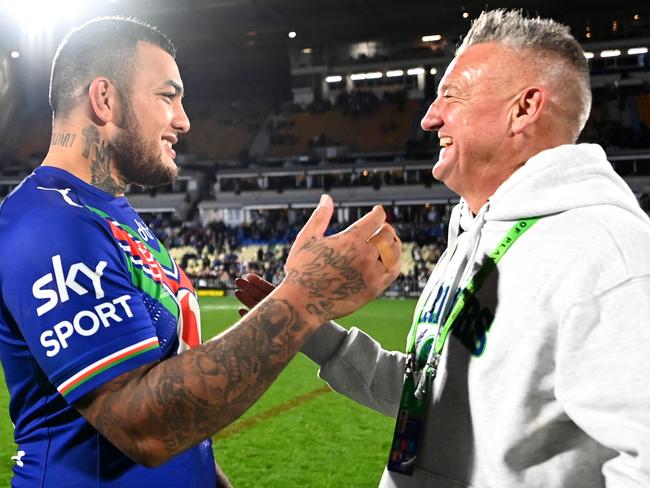
Mark Robinson $1 billion
Owner the Warriors
The owner of global textile manufacturing company Autex purchased the Warriors in 2019.
And he makes it clear the club will never be put up for sale.
“I’ll leave the Warriors in my will for my family,” he says, “That’s how much it means to me.
“I grew up with league in my bloodlines from my dad and played for 20 years. I love it”
The 59-year-old is obsessed with rugby league and ensuring the Warriors remain a premiership powerhouse.
“I bought them for the people, not myself,” he said. “You don’t make money, but if you do it’s reinvested into the club,” he said.
“I’ve got no idea how much I’ve spent on them – probably more than $25 million.
“My goal is to build them into one of the best sporting clubs that there’s ever been.”
Robinson is one of the more colourful characters of all the billionaires.
There was a story two years ago when he almost came to blows in a pub with front-rower Matt Lodge after an argument over the team’s poor performances.
“It was two alpha males having a disagreement,” he said.
“There was no push and shove or yelling and screaming.
“He wasn’t happy so I bought him out of his contract and he was free to leave.”
The others
Most NRL clubs these days have wealthy owners or investors, not all of them billionaires.
Melbourne Storm’s owner Gerry Ryan, the Jayco caravan king, is worth $750 million.
The Frizelle and Penn families, who own the Titans and Manly Sea Eagles respectively, are worth hundreds of millions.
Former player Adam MacDougall, who made his money through Manshakes, is now worth $635 million and is a long-time supporter of the Knights.
Cronulla chairman Steve Mace is worth around $500 million and heads a board that includes Morry Waked, who is worth around the same amount.





